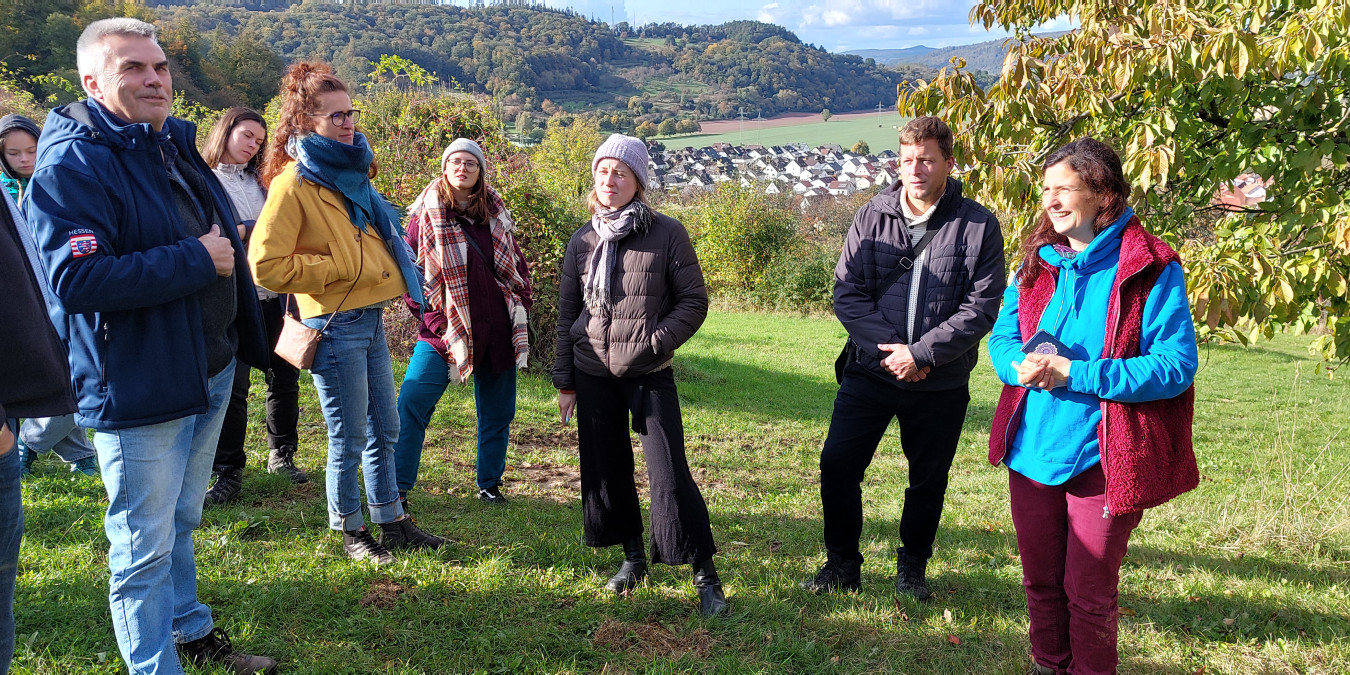Sowing the Seeds of the Future: A field-trip to an organic farm offers inspiration
Published: Dec 21, 2024 Reading time: 3 minutes Share: Share an articleKnowledge is, in a sense, organic. Like any organic lifeform, it needs the right conditions to grow and thrive — it needs to be nourished. This is why our EUKI ELCA project includes both theoretical and practical learning aspects. As part of the project, participants were invited to see the benefits of pioneering organic agroforestry efforts in Germany.

The last day of the study week for the Czech and Romanian participants included a visit to the Werragut organic farm near Eschwege. Here in the early morning hours, we were welcomed by project manager Konstantin Sprenger, who took them on a tour of the farm.
The farm comprises 30 hectares of arable land plus 20 hectares of grassland. Laying hens and broilers are kept in mobile sheds. Turkeys are also fattened in a fixed barn. Arable farming, grassland, fruit and nut growing, livestock farming, social farming and nature conservation are combined to create a new learning centre.
In 2021, a pioneer agroforestry system was established for the region in which trees, shrubs and arable farming are combined. With the help of 'Triebwerk' (Regenerative agriculture and agroforestry UG), the Werragut team planted the first trees in the syntropic system designed by Swiss agronomist Ernst Götsch. More than a thousand berry bushes, fruit and nut trees alternate with arable land, grassland and woodland on a total of twelve hectares. A total of fourteen edible species were planted: pear, apple, sweet chestnut, walnut, cornelian cherry, large and small mulberry, hazelnut, olive willow, fig, Szechuan pepper, persimmon, pawpaw, and haskap.
Agroforestry makes an important contribution to climate action and food security
"Agroforestry is one of the most exciting topics in climate-adapted agriculture," said Federal Minister of Agriculture Cem Özdemir during this year's visit to the project at the Werragut organic farm in Eschwege. "The climate crisis does not stop at agriculture,' Özdemir continued. "Farmers are the ones most affected by the climate crisis. In this respect, it is clear that agroforestry is not the only answer, but it is one answer."
Considerable amounts of carbon dioxide are bound in the wood of fruit trees and shrubs. Under the protection of the trees, the microclimate in the field is improved, and evaporation is reduced. The systems can better withstand longer periods of drought. Some types of fruit are better adapted to climate change than others: Figs, for example, tended not to fare so well in previously cooler Germany. With warmer temperatures, however, they are opening up new habitats. The same applies to persimmons, which tend to thrive in mild climates with warm summers.
Visit to the GNE fruit-growing trial centre in Witzenhausen-Wendershausen
After the lunch break, the group travelled back to Witzenhausen-Wendershausen to the GNE fruit-growing trial facility. Under a cloudless sky with bright sunshine, the group was welcomed by Eberhard Walter, the former fruit-growing advisor of the Landesbetrieb Landwirtschaft Hessen (LLH). For 40 years, LLH employees have been carrying out planting trials on the plantation in collaboration with the Justus Liebig University of Giessen and various tree nurseries. Young cherry trees, some of which are rare, old and valuable varieties, are planted for the German Fruit Genebank (DGO). The diverse varieties are to be preserved primarily because of their breeding and socio-cultural characteristics, today also selected and adapted to climate change effects.
The plantation has been managed organically by the GNE since 2021. Synthetic pesticides are not used. Organic fertilisers and pesticides permitted in organic farming, such as copper and neem are applied in spring.
There are 200 rootstocks with around 60 varieties on the plantation. They were grafted with 'Gisela 5'. This popular variety is used as a rootstock in all sweet cherry growing regions worldwide. Witzenhausen is involved in international sweet cherry rootstock research. Six rootstocks with particularly high yields and high resistance to climate change have been exported from here all over the world. For example, Mr Walter supplied various rootstocks to the research station in Klausenburg (now Cluj-Napoca) in Romania.
Sources:
https://www.werragut.de/
https://resola-ev.de/
https://www.startnext.com/vielfalt-durch-agroforst
https://www.gne-witzenhausen.de/demonstrations-und-versuchsanlage-wendershausen-fuer-dauerkulturen/



